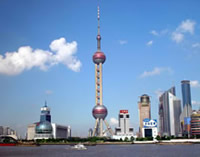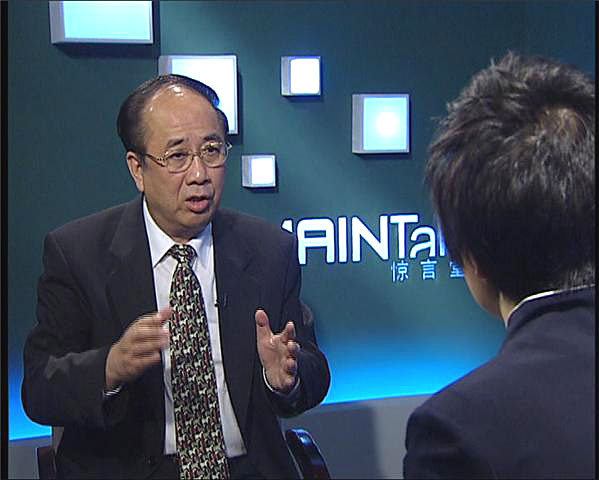|
|


ADVERTISEMENT
Buy Your own advertising
spaces!
.
Download Adobe Acrobat Reader to open [PDF] files.
Recent Visitors
Chinese media should switch on for half a year covering the 2010 Expo
2009. 19 May
Big steps need to be taken to better explain China to the world. In the
1980 UNESCO publication Many Voices One World, also known as the MacBride
report, the book identified the world’s current communication trend:
concentration of media and unequal access to information. (english.eastday.com) - Zhao Qizheng, Chairman of Foreign Affairs Comm., CPPCC
(english.eastday.com) - Zhao Qizheng, Chairman of Foreign Affairs Comm., CPPCC
Guest Profile:

Zhao Qizheng started his work expressing China at the end of the 1990s. Between‘98 and 2005, he worked as spokesperson for the State Council press office, and was later crowned as“China’s No.1 press officer”. At the end of 2005, he was invited to work as dean of the Journalism School at Renmin University of China.
Q: Why did the promotion of China not pick up as fast as China’s economic growth in the past few years?
R: There are many reasons. One is that we’ve only been opened up for 30 years. Before; we were quite self-enclosed and had little contact with other countries. And our economy was not global, so little contact with the outside world at that time was ok. Now things are very different and we need to heighten our interaction with the international community. What happens in China tends to be a concern of the entire world, and in turn China is largely subject to its outside environment. Since we opened up so late, we did not express ourselves clearly enough to the outside world. The Chinese language is really complicated and there are so many distinctions compared with other languages in the world. Although Chinese is spoken by a large population, in terms of the number of countries, few can really understand it.
Q: Is language the only barrier?
R: It matters a lot. Our newspapers, magazines and films cannot advance across borders if they are not properly translated, and translation itself is also a problem. This sort of cross-cultural translation is much more complicated than the language translation itself. That’s why a number of our prominent works cannot really appeal internationally. As far as I know there are only about twenty well-qualified English translators in Beijing who can elegantly translate Chinese novels into English. Therefore the promotion of China and its culture is difficult.
Q: Do we have an appropriate solution to that?
R: We need to focus on two aspects. One is that we learn from some countries promoting Chinese worldwide. For example, we have set up 200 Confucius Institutes around the globe. But it takes time to work. The other thing is that we could engage those foreign experts specializing in Chinese and Chinese affairs as well as journalists and editors who understand China to introduce the country. In doing so, we can overcome cultural differences. Essentially, China has to have great journalists, editors and efficient English-speaking channels. Only when we have all these, can we express China clearly.
Q: As I work personally in the news circle, to me it seems much easier to spread and contribute information to daily news? Is it probably easier for foreigner to understand what China is like today through news, daily news especially, than read a translated Chinese novel, isn’t it?
R: However, we have difficulties in transmitting news abroad. Although we have quality journalism, its international presence is weak. For example, in Washington, the BBC has 200 reporters, while journalists from China Daily, Xinhua news agency, CRI and other media organizations only have one tenth of that number in total. And they are Anglo-Saxons and of similar culture, so it’s easier for them to have more contacts and get access to news leads. In contrast, for Chinese reporters to get first hand exclusive news abroad is very difficult. What we lack is a broad public relations network. Without an effective network, we cannot have an exclusive news source. For general breaking news, there is no difference doing it in Beijing or in Washington, as the Internet could provide the same information and guarantee the same speed. What is desperately needed is the ability to catch unique news, unique interviews and exclusive interviews. Take ICS for example, two vital elements stand out: exclusive, real-time news and interviews with important figures. The interviews come from years of accumulated thought and the interviewee’s viewpoints of the latest changes.
Q: But as for foreign viewers or readers, who will bother to watch say CCTV in the states or in Europe, or read news from a Chinese media website?
R: You hit the point. We have China Daily, CCTV9 and even CCTV E and CCTV F, all targeted at foreigners, but do they read or watch us? It’s based on two aspects. One is the increasing importance of China, and what happens here is of international concern. So that a special news story attracts a lot of attention abroad and even gets reprinted. And the other is our local news agenda. Local stock, local weather and local shows, local happenings as in robberies or car crashes, they do appeal to some foreigners who want to know about this country or a city. But for the general foreign audience, if they have 200 channels at home, why would they make a Chinese channel their priority? Except for Chinese abroad or those who study China, China’s English-speaking channels will not be a foreign audience’priority. CNN is most likely their priority, because their news is real-time, their special angles, and their in-depth comments. Although the comments are not necessarily correct, we are not able to make similar comments right now.
Q: Is there a need for us to examine the way we use the language to promote China? In your book you said we need to use China stance, an International expression, what do you mean by that, How do you define that?
R: China stance means, say you are a Chinese reporter for Chinese TV stations, so no doubt you will cover more stories related to China and Chinese people, this is how we can present China to the entire world and help foreigners better understand China. When covering international affairs, our angles should clearly reflect what the country stands for. We should voice China’s opinions on the Korean Peninsula nuclear issue, Chinese leaders meeting with the EU at the G20, and recent political riots in Thailand. So the China stance is not a selfish one. Chinese reporters are responsible for making China clear to the whole globe. China is always interpreted differently internationally. Of course, I will come to Xinhua news agency, CCTV and Shanghai TV, because we trust our own reporters. And just for the China stance, journalists have to be responsible, honest and accurate. China stance is not selfish and harmful; it’s not lies and false information. International expression is to make us understandable globally. This is hard. Sometimes it is even hard for Chinese to understand an article in its mother tongue. I think the wording we use in print differs from the way we speak. Print versions are too literary. So our expression should be simple and understandable.
Olympic Games always attract intensive media coverage. While media help promote the Games, the Olympics, in return, has served as a catalyst to the globalization of the media industry.
As China has come to an unprecedented period of opening public opinion, the 2008 Beijing Olympics became a platform for foreign media to extend its influence and for Chinese media to present itself and change its competition structure.
Q: The 2008 Beijing Olympics and the 2010 Shanghai World Expo are viewed as big events for China’s image and also for China’s media. So how do we actually present China’s image through these 2 platforms against the current backdrops?
R: The opening ceremony and the following sports events attracted many foreign viewers. Our ratings from a foreign audience exceeded what it’s been over the last two or three decades combined. I mean, it’s pretty successful in terms of viewing span and scale. Still, when it comes to the Chinese media, the coverage before the opening ceremony was more focused on infrastructure and sports facilities instead of ordinary people’s feelings towards the event. There were more reports on physical construction than those of human angles. We weren’t aware of this situation in the beginning and it wasn’t re-addressed until the first half of 2008. As to those foreign media, frankly speaking, we Chinese were not satisfied with what they reported before the event started. They tended to be critical of almost everything; some reports even exaggerated the downsides. It didn’t bother us that problems were pointed out during preparation. For instance, after their overstatements on the bad air conditions in Beijing; we managed to improve air quality immediately. They criticized Beijing’s traffic and it too was later improved. We can accept such criticisms. But their comments on China’s politics, on the Dalai Lama, were not true, and thus unfair to the Chinese government, every Chinese individual, every overseas Chinese and those foreigners who knew the truth. Because the Dalai Lama is not a religious leader but a political figure who attempts to separate Tibet from China and it is unfair that foreign media starkly concealed this respect and even reported negatively on the central government’s policies towards Tibet. But after the Olympics started, reports in the foreign media were generally positive towards China. This wouldn’t have been successful without our help getting foreign journalists access to information, especially our encouragement to officials, residents, and athletes to accept interviews.
Q: Yes, to China, it is a very big step forward.
R: Still, some foreign journalists are not satisfied with this progress, because sometimes they were declined when approaching officials for an interview. This reflects some officials’lack of media training to communicate with foreign journalists. They tend to say I’m unavailable, so it saves trouble for them by keeping silent instead of making mistakes. In contrast, many Beijing residents deal better with foreign media, as they do not have any pressure. So training is quite important for officials. Against the backdrop of economic globalization, how could one avoid talking with foreigners? Some barriers do exist in the process of cross-cultural communication. We can learn. For this reason, I wrote a book.
The book Zhao published in 2007 is called one world- Bridging Communication Gap. It recalls 101 of his own experience as China’s communication official dealing with his foreign counterparts. In it he elaborates how to overcome cultural barriers.
Q: Do you think the 2008 Beijing Olympics helped to promote a real China?
R: I find it rewarding. First, foreigners often questioned whether the Beijing Olympics would be well-organized, could they be perfect? In fact, the organization was almost perfect. So this country is capable of organizing such an event. But there were other questions like: would Chinese athletes be competitive enough? Do they rely on drugs? No, actually they had been training very hard. Were the Chinese people welcoming enough to foreigners? Absolutely. Some foreigners had more understanding of the country after they toured around other parts of China during their stay. Especially during the opening ceremony, the group dance performance won big applause. They said that the performances on such a large scale fully showed the collectivism of the Chinese people, pretty admirable. Many of my foreign friends spoke highly of the performance, which had 2008 people striking the drum called the fou. A foreign university president told me that in their country there is no way to assemble even 208 people. So impressive! What impressed him the most was not the gold medals in competition, but the spirits of volunteers. It’s a good way to understand Chinese.
Q: How do you view the upcoming world expo in Shanghai? It is another big thing for China after the Olympic. But the time duration, the location, the venue, and the world opinion and the overall environment is very different from the 2008 Beijing Olympics.
R: Expo 2010 Shanghai, China. As you can tell from the name, the event does represent the whole country. It is a platform for every participating country to present their today and tomorrow, a milestone of civilization and progress. The Expo enables us to observe the trends of the world and it’s enlightening. So, every participating country will express them as much as possible. We should always try our best to work on the China Pavilion. After visiting the previous Expos, I’m personally dissatisfied with the China pavilions; maybe I’m a little bit demanding. Still, since China will host the next Expo, we should never make do with any dissatisfaction. And we must work as hard now as we did during the Beijing Olympic preparation. We should pay special attention to its organization and security.
Q: How can China avoid a media slack-off on this half-year event, after all six months more? Do we have a tailor-made media plan for Chinese reporters covering this event?
R: The Chinese media, especially journalists, when others are exhausted, it’s the best time for those who are not to stand out. So those with high aspirations shouldn’t be fed up with work. I’d like to remind you sources deserve attention, so you must know when and who will come. Also, you must dig up new ideas and insights from the interviews. If you get an exclusive with a VIP, it’s necessary to set up the studio on the spot and interview him for 20 minutes. Journalists are entitled to get help and good facilities. Nothing should stop journalists. If you want to interview anyone, just do it and do not wait for the PR people to arrange it. Just go and get the interview. I have been to many countries, and I feel journalists in every country have their own characteristics.
Q: What country’s journalists left you the strongest impression?
R: I find their working style varies. For instance, US journalists tend to dig through your thoughts in a relaxed way, before you realize it; it’s recorded and done. The French reporters are likely to be detail-conscious in terms of interview design, pace, etc. The Japanese journalists impress me by their meticulousness. If it’s a recorded broadcast…I remember once in Japan, I was scheduled for a 40-minute broadcast on TBS. They recorded only 42 minutes. The TBS journalist said if we record for 80 minutes, we both would be too relaxed, and the program would not be passionate and exciting. A 42-minute interview is similar to live broadcast. The 2 extra minutes are leeway to cut out stumbles. But our Chinese TV stations, they will make a small-sized suit with excessive material. Chinese interviewers tend to have long interviews, and select the best part. But it costs too much, and interviewees and interviewers will slack off.
Q: Now you mentioned during the Beijing Olympics, especially at the beginning stage there were too many reports on the hardware for the facilities, but not enough on human angle. Is this a lesson that we can learn from when covering the World Expo?
R: Compared to the Olympics, reporting for the Expo is harder. The coverage of Olympics focused on infrastructure such as building the Water Cube and the Bird’s Nest Stadium and so on. But we don’t want to miss the human-interest reports. The upcoming Expo Shanghai will exhibit high-tech products. I still hope the Chinese people can learn more about them. First, journalists are likely to find technical reports confusing. So, we should talk to related foreigners with an open mind, and interview them. What you write should be the result of what you understand. This can’t be compared to reports about road construction or the Water Cube. Reporting technical content is more complex than reporting gold and silver medals, which are more easily explained. With hi-tech products, if you don’t know much about them, you can’t explain them clearly in your reports. Or if you do have a technology background, you tend to rely too much on jargon. This will end up confusing audience. So, I think that if I were a reporter, I would explore the pavilions everyday, I’m sure I will dig up something worthwhile for my reports. That’s where the challenge is. The second is human-interest reporting. It requires journalists report both domestic and overseas visitors’experiences. Since you are Shanghai journalists represent your city. If you report a Shanghainese talking to foreigners he/she is indeed representing the Chinese people. So, individuals are very influential representatives of our nation. To foreigners, each and every Shanghainese is like a Chinese book. They are varied, some colorful, some black and white, some deeper, and some shallower, some are like cartoons, some are full of ethics. Each of them represents China.
Q: What if were ever the people in Shanghai asked about sensitive issues, for example, the Tibet, the Falun Cult, How should they respond?
R: For ordinary Shanghainese, just say what you know. There is no standard answer for such questions. In those man-on-the-street interviews, there are good answers, bad answers, some give clich�answers and some say the words that have been put into their mouth. There is no need to do so. If you can’t answer, say so. But what everyone knows is Tibet has been part of China since ancient times. That’s enough. It’s not that we want everyone to be politicians, just express your thoughts and that’s fine. I think the Shanghai government should launch cross-cultural education citywide.
Source: http://english.eastday.com

